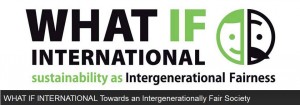The think tank WHAT-IF International is campaigning to ensure that intergenerational justice becomes an integral part of the discourse in EU policy-making, as Antony Mason reports
One of the enduring legacies of postwar politics will be its short-termism. The old social contract between generations has been broken: no longer does the current generation abide by its traditional duty to leave the world to the next generation in the state in which they found it – or better.
The Intergenerational Foundation has been established to change that: to make sure policy-makers think not just of themselves, and their own cohort and voters, but of younger generations, and generations not yet born. We are making some progress.
At a European level WHAT-IF International is doing much the same thing. It shares a very similar outlook and concerns with IF about issues such as the consequences of an ageing population, and the narrowing dependency ratios between taxpayers and the recipients of state benefits (health and social care, pensions and so on). To gain a measure of this, see their Policy Paper entitled “From Ageing to Intergenerational Fairness – Opening the Problem and Solution Space”.
WHAT-IF has been working in the context of two European initiatives: the European Year for Active Ageing and Solidarity between Generations 2012, and Horizon 2020 (“a framework programme for research and innovation”). On 24 April 2013 it presented a Joint Statement at the European Parliament entitled “A Challenge for Horizon 2020: Ageing and Intergenerational Fairness”.
I attended their conference in Brussels organised to mark that occasion. The day split into two parts. First we had a series of about a dozen talks at the offices of the Trentino Region. Then we went to the European Parliament for the formal session; this was hosted and chaired by Kartika Tamara Liotard, MEP, Rapporteur of the European Innovation Partnership on Healthy and Active Ageing, and co-hosted by Maria da Graça Carvalho, MEP, Rapporteur of Horizon 2020, and there was additional ‘key-participation’ from Làszlò Andor, European Commissioner responsible for Employment, Social Affairs and Inclusion.
It was an impressive event, with well-informed debate about a wide range of intergenerational issues, always with clear sight of the need to find practical solutions.
About WHAT-IF
WHAT-IF International was founded in 2010 by its president, Professor Matteo Bonfacio, Researcher in Organization Sciences at the University of Trento, and currently Visiting Fellow at the University of Cambridge Judge Business School. Their motto is “sustainability as intergenerational fairness”. The organisation has attracted an impressive group of supporters from across Europe – from the academic world, institutions of the European Union, business, education, and organisations involved in intergenerational practice (promoting the benefits of active engagement between the young and the old).
Their Joint Statement to the European Institutions and Citizens proposes solutions to the predicted problems which will arise from an increasing aged population. These largely centre upon switches in culture to accommodate the change, and the need to promote good intergenerational practice.
The details of that are open to debate – which is, of course, precisely what WHAT-IF wants to stimulate. And if they can get the EU parliament and institutions to think intergenerationally – and systematically so – when formulating policy, much will have been achieved.
All power to their elbow!
